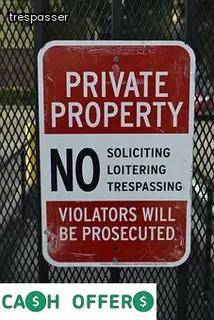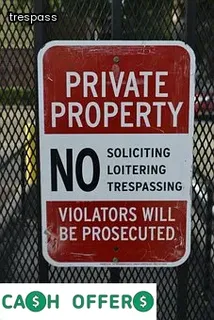Squatting in Michigan is the act of occupying a property without the permission or knowledge of the legal owner. When someone squats on a property, they take possession of it and can legally remain there until the rightful owner takes action to remove them.
Squatting is illegal in Michigan and carries severe penalties, including fines, jail time, and eviction from the property. Squatters have no legal rights to stay on or use the property, but they may be entitled to certain protections against eviction if they have taken certain steps to gain access or possess the property.
It is important for homeowners and real estate owners to understand their rights regarding squatters in order to protect their properties and ensure that any necessary measures are taken in a timely manner.

Squatting in Michigan is an increasingly common problem for homeowners and real estate owners. People become squatters in Michigan for a variety of reasons, including lack of affordable housing options, high rents, overcrowding, homelessness and poverty.
Squatters may also take up residence in a property due to job loss or relocation, or because they have been evicted from their previous home. In some cases, squatters may be unaware that they do not have permission to occupy the property until they are confronted by the rightful owner.
Others may simply choose to ignore the law and take up residence without permission. Regardless of the reason why people become squatters in Michigan, it is important for homeowners and real estate owners to understand their rights when it comes to evicting them from their property.
When it comes to understanding squatters rights in Michigan, the state has a unique law known as adverse possession. This law states that if an individual occupies a property for a continuous period of 15 years or more, they can apply to legally own the property.
In order for an application to be successful, the individual must prove they have made improvements on the land and paid taxes. Additionally, they must show that they had exclusive use of the land during this time period and had the intention of claiming it as their own.
There are certain requirements that must be met before an adverse possession claim can be valid under Michigan law. These include making regular payments on property taxes and providing evidence of open and notorious occupation of the property by living there or using it for agricultural purposes.
Furthermore, claimants must demonstrate that their occupancy was uninterrupted for at least 15 years with no permission from the rightful owner. It is important for homeowners and real estate owners to understand these laws in order to protect themselves from potential squatters who may attempt to claim their land through adverse possession.

Navigating the Adverse Possession process in Michigan can be a complicated and arduous task for homeowners and real estate owners. It is important to understand the laws in place that protect squatters, as well as the rights of those who own or are currently living on the land.
In Michigan, squatters may have a right to claim ownership of a property based on adverse possession if they meet certain conditions. These conditions include continuous and exclusive occupation of the property for at least 15 years, along with payment of taxes and other legal requirements.
Additionally, it is essential that there be no written agreement between the squatter and owner of the land during this time period. If all these criteria are met, then under Michigan law, squatters may be able to obtain legal title to the property after 15 years.
It is important to note that this process can be complicated and require assistance from an attorney who specializes in real estate law or eviction proceedings.
Filing an Adverse Possession Claim in Michigan is a process that all homeowners and real estate owners should understand. The first step is to identify whether the property you are claiming meets the requirements of adverse possession.
In Michigan, property must have been occupied by a squatter for an uninterrupted period of 15 years or longer before they can claim it. The next step is to file a Summons and Complaint with the local court in the county where the property lies.
This requires you to provide proof of your ownership and a legal description of the property, as well as other details about how long it has been occupied by the squatter. After filing, you will then serve a notice on the squatter to inform them of your claim and give them an opportunity to respond in court.
If no response is received, a judge will make a decision on whether or not adverse possession applies and award ownership to either party accordingly. It’s important to note that adverse possession laws vary from state-to-state so it’s essential that homeowners and real estate owners understand their rights when dealing with squatters in Michigan.

When it comes to understanding the rights of squatters in Michigan, Color of Title claims can be an important factor. This is a legal term that describes when someone has been living in a property and treating it as their own without having an official ownership title.
It can also include cases where someone has purchased a property with a deed or other document that is later found to be invalid. In these cases, the squatter may have established Color of Title and could have rights over the property even if they don’t officially own it.
To investigate these claims, homeowners and real estate owners should understand the specifics of Michigan law. They need to consider aspects such as how long the person has been living on the property, what evidence they have presented to prove occupancy, if they’ve made improvements or changes to the property, and more.
It’s important for all parties involved to understand their rights when dealing with Color of Title claims so that any disputes or disagreements can be resolved fairly and legally.
Understanding squatters rights in Michigan can be a complex topic for homeowners and real estate owners. Color of title claims are just one element that should be taken into consideration when dealing with squatters.
Color of title claims refer to the squatter's possession or ownership of a property through an informal agreement, such as rent payments, which gives them the illusion of legal ownership. It may also refer to when a squatter has had prior possession of the property for more than 15 years and can claim that they have color of title.
While these claims can be advantageous in some cases, there are both pros and cons associated with them. On one hand, color of title claims may give squatters certain rights if they have previously owned the property or if they were unaware that they were violating any laws regarding squatting.
Additionally, it could make it easier for the squatter to gain full legal ownership of the land if they can prove that they've been living on it for an extended period of time without any objections from previous owners. On the other hand, this type of claim may not always stand up in court if challenged by a homeowner or real estate owner who is aware of the squatting situation on their property.
Furthermore, even if a color of title claim does hold up in court, it could still result in costly legal battles between all parties involved and take away from valuable resources that could be used elsewhere.

Many Michigan homeowners and real estate owners may not be aware that squatting is addressed in the Michigan legal system. Squatting is defined as occupying a property without permission from the owner or having any title or legal right to the property.
This practice has been in existence for centuries and is still present today, especially in urban areas. Squatters rights, also known as adverse possession, give squatters certain legal rights if they meet certain conditions.
In Michigan, these conditions involve using the property continuously for 15 years or more and paying any taxes on the land during that time. Additionally, squatters must have an intention to possess the land and openly occupy it as their own without hiding their behavior from anyone.
If all of these requirements are met, then squatters can acquire legal title to the land after 15 years of occupancy. Although this process can be complicated and lengthy, understanding how squatters rights work in Michigan is important for homeowners and real estate owners who want to protect their properties from potential squatters.
When dealing with squatters in Michigan, legal strategies are an important tool for homeowners and real estate owners to understand and utilize. In the state of Michigan, it is unlawful to use or occupy another person's property without their permission.
To remedy this situation, landlords may file a complaint in court against the squatter and seek a court order requiring them to vacate the premises. Additionally, landlords can serve written notice on the squatter, informing them that they must leave within 24 hours or face possible arrest or other legal action.
If squatters refuse to leave after receiving this notice, landlords may be able to obtain an eviction order from the local courts. Furthermore, Michigan law allows homeowners and real estate owners to use reasonable force – including physical contact – to remove trespassers from their property.
However, it is important to note that any use of force must be necessary and proportionate so as not to violate the rights of the squatter or expose oneself to criminal liability. Finally, it is important for homeowners and real estate owners in Michigan to understand their local laws regarding squatters' rights before attempting any of these strategies.

The presence of squatters on a property can have a significant impact on the value of that property and the taxes owed on it. Unauthorized occupants can reduce a home's appeal to potential buyers and cause them to be less likely to make an offer.
This can drive down the market value of the property, resulting in fewer overall tax dollars owed. Additionally, if squatters are occupying the home for a significant period of time, they may be considered legal tenants and the owner could then be liable for back taxes related to rental income.
The owner could also potentially face fines for failing to pay past due taxes or even criminal charges if they fail to evict the tenant in accordance with local laws. It is therefore important for homeowners and real estate owners to understand their rights in order to prevent such issues from arising.
In Michigan, landlord-tenant disputes involving squatters can provide an important opportunity for homeowners and real estate owners to gain a better understanding of their rights when addressing the issue of squatting. While there are many different types of situations that may arise, it is important to understand the laws in Michigan that pertain to squatting so that property owners can confidently protect their rights.
In many cases, landlords will find that they need to take legal action in order to evict a squatter from their property. It is also critical to be aware of the various forms of compensation available should a squatter be found occupying a property without permission.
Knowing how to handle these disputes in a professional manner can help prevent further problems down the road while ensuring that both parties have access to the resources they need for resolution.

Entering into a lease agreement with a squatter can be a risky undertaking for homeowners and real estate owners in Michigan. It is important to thoroughly assess the risks before signing any contracts.
First, homeowners need to understand that they may not be able to evict squatters as easily as other tenants, due to their special legal rights. Second, it is essential to perform full background checks on potential tenants, including running credit and criminal history checks, as well as confirming that the tenant has sufficient funds or income to pay rent.
Additionally, if the squatter has made significant improvements or alterations to the property during their stay, it is important for the homeowner or real estate owner to take these into account when determining the length of the lease agreement. Finally, any lease should include provisions for dealing with non-payment of rent and other tenant violations of the agreement.
Taking these steps will help ensure that both parties are protected and that the homeowner or real estate owner does not suffer financial losses from entering into such an agreement.
When it comes to understanding and protecting yourself against squatters in Michigan, there are a few key considerations to keep in mind. First and foremost, it’s important to understand the laws surrounding squatters and their rights under Michigan law.
Knowing the legal implications of allowing someone to inhabit your property without permission is essential for protecting yourself from potential liability. Additionally, while you can take steps to evict a squatter from your home or property, having an established procedure in place ahead of time is key.
This should include a process for screening prospective tenants and ensuring that rental agreements are up-to-date and legally binding before allowing anyone onto your property. Finally, understanding how occupation taxes work in Michigan can be extremely helpful when dealing with squatters; these taxes are paid by occupants regardless of whether they have been given permission or not, meaning that even if they don’t vacate your space they may still owe money.
Taking all of these precautions into account is integral for any homeowner or real estate owner looking to protect themselves against squatters in Michigan.

As a homeowner or real estate owner in Michigan, it is important to understand the rights of squatters and how to safely prevent them from entering your home. Knowing the law can help you protect your property from both legal and illegal actions taken by squatters.
Understanding what constitutes squatter's rights in Michigan, including the necessary steps for eviction and removal, as well as ways to protect yourself before squatting occurs, can help keep your home secure. Homeowners may benefit from physical security measures such as fences, locks, cameras, alarms, lighting and signage that clearly indicate trespassing is not allowed.
Additionally, establishing a network of neighbors who are aware of suspicious activity can be beneficial in avoiding entry by squatters. When all else fails, consulting with an attorney or local law enforcement may be necessary if a squatter has already entered your property.
By knowing your rights and taking proactive steps to protect against unauthorized occupants it is possible to maintain ownership of your home without incident.
If you are a homeowner or real estate owner in Michigan, it's important to understand the differences between townhouses and houses when deciding which is right for you. Townhouses are usually attached to other units on one or both sides, while single-family homes (aka houses) stand alone.
This means that townhouses tend to be more affordable, as they share common walls with the neighboring unit, while houses may require additional expenses like fencing and landscaping. When it comes to squatter rights, townhouses often have less protection than houses due to their shared walls and spaces.
Houses may provide more protection from squatters because of their separate ownership, though Michigan law does provide some protections for both types of dwellings. It's important to research your local laws and ordinances before making any decisions about purchasing a home or renting out property in order to ensure that you know what kind of rights and protections are provided for you as an owner or tenant.

Understanding property taxes in Salt Lake County, UT is important for homeowners and real estate owners as it affects squatters’ rights. Property taxes are determined by the county assessor's office and are based on the assessed value of a property, which is often lower than the market value.
The amount of tax owed is calculated by multiplying the assessed value with the current tax rate. Homeowners in Salt Lake County, UT can view their property tax information online via the county's website or they can contact the county assessor's office directly to request a copy of their property tax bill.
It is important to understand that failure to pay taxes on time may result in penalties or even foreclosure proceedings depending on local regulations. Fortunately, there are various payment options available for those who need assistance with paying their taxes including installment plans and homestead exemptions which help reduce the burden of tax payments for eligible individuals and families.
Comparing insurance rates for home and auto insurance in Michigan is an important part of understanding squatters' rights. Homeowners and real estate owners must be aware of the different types of coverage available, as well as their costs, to make sure they have adequate protection.
It may be beneficial to shop around for the best rates from multiple insurance companies, as prices can vary widely. Michigan drivers must carry at least a minimum amount of liability auto insurance to be able to legally drive in the state; however, additional coverage such as collision or comprehensive protection is recommended for more extensive protection.
Homeowners in Michigan should consider homeowners' insurance policies that cover damage from fires, storms, theft and other disasters that can affect their property. The cost of these policies will depend on the size and value of the home, as well as any additional coverage purchased.
Understanding squatters' rights in Michigan requires knowledge of the various types of insurance available so homeowners and real estate owners can make sure they are adequately covered against potential risks.

Michigan is one of the few states that have specific laws governing the rights of squatters. This guide for homeowners and real estate owners provides information about understanding these rights, including tips for finding affordable home and car insurance in Michigan.
When looking for car insurance, it’s important to compare rates from multiple providers and make sure you are getting the best coverage at the lowest cost. Shopping around can save you hundreds of dollars a year on auto insurance premiums.
Homeowners should also compare prices when it comes to homeowner’s insurance so they can get the protection they need without breaking their budget. Additionally, there are some discounts available to Michigan residents, such as multi-policy discounts or discounts for those who take safety courses or install safety devices like smoke detectors.
Taking advantage of these discounts can help reduce costs further and make sure you’re adequately protected in case of an emergency or other unexpected event.
Solar panels are a great investment for homeowners and real estate owners in Michigan because they provide clean energy and can save on utility bills. However, if these solar panels are not protected from hail damage, it can be an expensive repair or replacement.
Fortunately, there are steps that you can take to protect your solar panels from hail damage. Firstly, ensure that the mounting system is strong enough to secure the panel in place during severe weather conditions.
Secondly, consider investing in hail-resistant materials such as polycarbonate or tempered glass for the panel's covering. Thirdly, have a maintenance plan ready that includes routine inspections of the panels and any related equipment.
Finally, make sure that both your property insurance and manufacturer warranties cover any potential damage that may occur due to hailstorms. By following these steps, you can protect your solar panels from hail damage while ensuring all of your legal rights as granted by Michigan law are understood and observed.

In Michigan, it is important for homeowners and real estate owners to understand the regulations that govern solar panel installation and maintenance. Solar energy is a viable option for many people in the state, but there are a few key laws that must be followed when installing panels.
First, local zoning ordinances must be respected; most require a permit before work can begin. Additionally, any alterations to the exterior of a building require approval from both the local government and the property owner's insurance company.
Finally, safety measures must be taken during installation to ensure that no harm comes to anyone on or around the property. Regulations vary by municipality, so it is important to research them thoroughly before beginning any project.
Solar panel maintenance should also follow local regulations; any changes made after installation may require additional paperwork and fees in order to remain compliant with local laws. Homeowners and real estate owners who take the time to understand these regulations will benefit greatly in terms of both safety and cost savings.
In Michigan, squatters rights, also known as adverse possession, can be a bit confusing for homeowners and real estate owners. Adverse possession is a legal principle that grants certain individuals the right to use and occupy the land of another individual without permission or title.
This means that if an individual has been occupying land for more than 15 years in Michigan, they may be eligible for squatters rights, depending on their situation. To qualify as a squatter in Michigan, the individual must demonstrate that they have openly and notoriously occupied the property continuously for at least 15 years.
The squatter must also prove that they have paid all taxes on the property during this time period and have improved and maintained it in some way. If they are able to meet these requirements, they may be granted ownership of the property under Michigan law.
It is important for homeowners and real estate owners to understand these rules to protect their property from potential squatters.

Yes, Michigan does have squatter's rights. In the state of Michigan, squatters can gain legal ownership of a property if they meet certain conditions.
Squatters must occupy and use the property openly and continuously for fifteen years. During this period, the squatters must pay all applicable taxes and make improvements to the property.
The law also states that if the owner of a property has knowledge of the squatter's occupancy but takes no action against them for fifteen years, then the squatter is allowed to remain on the property with legal ownership. This means that it is important for real estate owners and homeowners to be aware of their rights when dealing with a squatter in order to protect their interests in owning or leasing a property.
In Michigan, squatters rights, also known as adverse possession, can be claimed after a person has lived on another's property continuously for 15 years. This is the shortest amount of time that a squatter can acquire legal title to the property.
The legal process behind acquiring squatters rights is complex and requires precise adherence to state laws in order to be successful. Homeowners and real estate owners should understand the potential risks associated with squatting and take steps to protect their property from potential squatters.
It's important to remember that while 15 years is the shortest amount of time required for an individual to claim squatter's rights in Michigan, it may still be wise to take proactive steps against potential squatters before they have occupied the land for that period of time.
Adverse possession laws in Michigan are designed to protect the rights of squatters who have established themselves as a rightful owner of a property. These laws prevent homeowners and real estate owners from evicting a squatter without going through the legal process.
In order for a squatter to gain title through adverse possession, they must occupy the property for 10 years or more, pay any taxes due on the land, and use it in an open and notorious manner, meaning that their occupancy is public knowledge. During this period, they also cannot hide their occupation from the true owner of the property or be found to be trespassing.
If all these criteria are met, then title of ownership can be granted to the squatter. Additionally, if any rent or mortgage payments are made by the squatter during this period, they may be eligible to receive compensation for their efforts when ownership is eventually transferred over.
By understanding Michigan's adverse possession laws, homeowners and real estate owners can protect their rights while ensuring squatters are provided with fair treatment under the law.